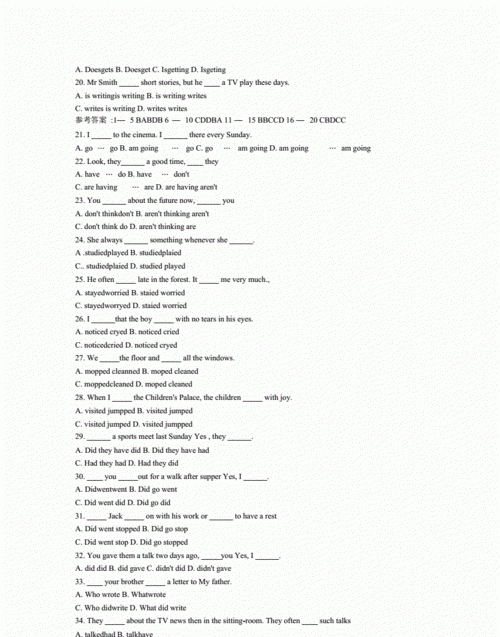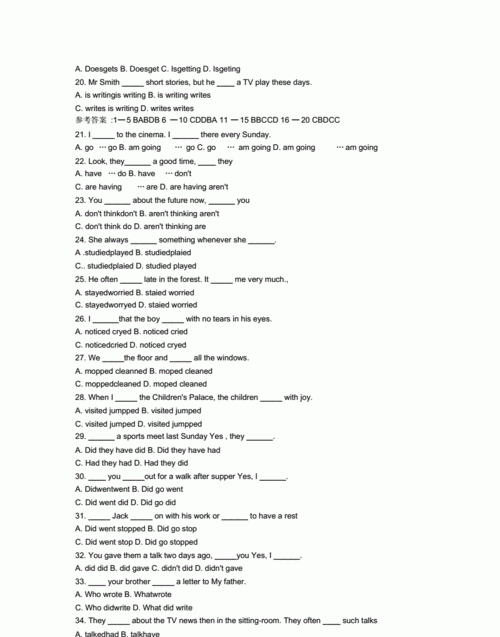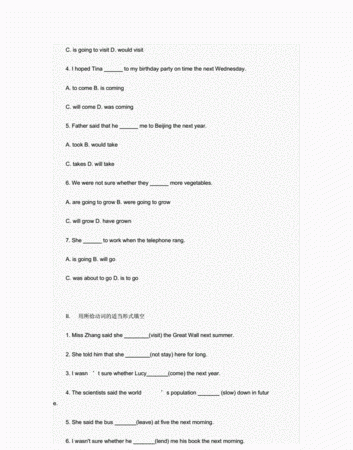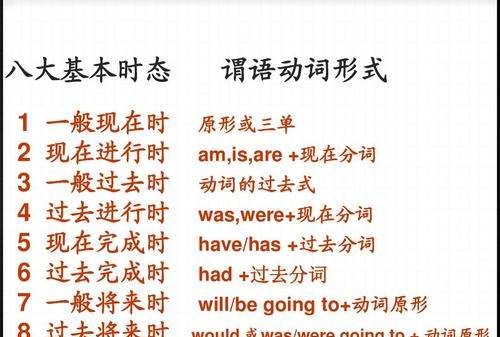本文目录
英语时态8种基本时态知识点总结
一般现在时表示习惯性、个人能力、普遍真理;表示“已经列入日程表”时常用一般现在时表示将来;
2.表示说话人始料的事,常用一般过去时;
3.进行时与某些频度副词连用时,常带有赞赏、厌烦等感情色彩;
4.时间状语从句或条件状语从句中常用一般时表将来;
5.will/be going to do/be about to do的用法区别;
6.固定句式中的时态搭配;
7.用主动形式表示被动意义常见的几种情况;
8.was/were going to do以及had intended/hoped/expected/thought等可表示本打算干某事,实际上未干成;
9.固定句式中的时态:
1)It/This is/was+the+序数词+time+that-----;
It/This is/was+the+形容词最高级+名词+ -----
2)hardly/scarcely----when,no sooner---than结构中when,than前的主句必须用过去完成时时than,when所在的从句用一般过去时;
3)It is(high)time that-----(早)该----结构中,从句谓语动词必须用过去时,是虚拟语气的一种;
4)It will be+一段时间+before+从句(从句谓语动词一般用现在时)
It was+一段时间+before+从句(从句谓语动词一般用过去时)
5)It is/has been+一段时间+since从句(从句用一般过去时)
It was/had been+一段时间+since从句(从句用一般过去完成时)
【考纲要求】时态与语态一直是热点,也是广大考生复习备考的难点。考纲要求考生应该具备较强的语言应用能力,能在具体语境中恰当、准确地使用某一特定时态;熟练掌握常见的8种时态,弄清16种时态,同时还要熟练运用特殊时态句式和用法以及不用被动式但表示被动的动词和短语。
【教法指引】高考对时态的考查非常灵活且难度较大,不易把握。大部分时态题答案的选择取决于题干语境;但也有部分时态试题较易把握,其用法相对固定,常见于特定句式结构中;还有部分常见时态用法特殊。综观近年来的高考单项填空题,动词成为考查的热点,在15个单项选择中,考查动词时态的题一般不少于2道,动词的时态常和语态、主谓一致结合在一起进行考查。教师在指导学生复习备考、答题中,要遵循如下思路:
① 这个动作可能发生在什么时间?题干句中可参照的时间信息有那些?
② 这个动作处于什么时态,是进行中,还是已经结束(完成)?限制或修饰这个动作的状语信息有哪些?
③ 这个动作与主语的关系,是主动还是被动?
只要全面细致地考虑了这些问题的答案,试题的正确答案也就水落石出了。
【知识网络】 动词时态与语态
一、动词时态
(一)一般现在时
一般现在时常以动词原形表示,但当主语是第三人称单数时,应用动词的单数第三人称形式。一般现在时主要有以下几种用法:
1、一般现在时表示现在经常发生或习惯性的行为或状态,常与usually, always, every day, twice a week, seldom, sometimes等时间状语连用。
He always sleeps with the windows open.他总是开着窗子睡觉。
2、一般现在时表示主语的性格、特征、能力等。He works hard .他工作很努力
3、一般现在时表示客观事实或普遍真理,也用在格言中。
The sun rises in the east.太阳从东方升起。
4、在时间、条件、比较等状语从句中表将来的动作
在由when, if, after, before, as, as soon as, the minute, the next time, in case, though, till, until, unless, so long as, where, whatever, whenever等引导的状语从句中,常用一般现在时代替将来时,但应注意,主句的谓语动词必须用一般将来时。The volleyball match will be put off if it rains. 如果下雨,排球赛将推迟
5、表示安排或计划好的将来动作,通常限于表示"运动"的动词,如:go, come, leave, start等。The train starts at 10 o' clock in the morning.火车在上午10点发车
(二)一般过去时
一般过去时表示过去某个时间发生的动作或状态,常和表示过去的时间连用,yesterday, last night, in 1990, two days ago等。也表示过去经常或反复发生的动作,常和often, always等表示频度的时间状语连用
1、表示过去某个特定时间发生的动作或状态,常有明确的时间状语,如yesterday,last night, some years ago,in1890等,以及由when等引导的时间状语从句。
2、表示过去某一段时间内经常或反复发生的动作常与often,usually,seldom等表示频度的副词连用。When I was in the countryside, I often called on my old friends there.我在乡村里,经常去拜访那里的朋友。
3、在条件、时间状语从句中,常用一般过去时代替过去将来时。
They said they would let us know if they heard any news about him.他们说如果听到什么关于他的消息,就通知我们。
4、表示虚拟语气
这一用法只适用于某些特定的句型,表示现在或将来的非真实、主观意图或愿望。
If only I had a better memory.要是我的记忆力好一点就好了。
If it rained tomorrow, the match would be put off.要是明天下雨,比赛就会延期举行。
(三)一般将来时
1、一般将来时表示将来某个时间要发生的动作或存在的状态,常与表示将来的时间状语连用,如tomorrow, in the future, next year等。一般将来时由"助动词will/shall+动词原形"构成。
2、一般将来时的其他表达法
(1)"be going to+动词原形"表将来
①这种结构表示打算、计划、决定要做的事或肯定要发生的事。
They are going to meet outside the school gate.他们打算在校门口见面。
②还可表示说话人根据已有的事实或迹象,认为某事即将发生、肯定会发生或可能出现的情况。I think I'm going to die. 我想我要死了。(现在生命垂危) Look at the cloud. It's going to rain.瞧那乌云,天要下雨了。(乌云密布,使我断定天要下雨)
③这种结构表示"肯定、预测,注定会"。在这种情况下可以和"think, hope, want, belive, like"等表示静态的动词连用。 He failed in the exam; he knew he was going to when he looked at the test paper.他没考及格,他一看试卷就知道考不及格。
The voters aren't going to like him.选民们不会喜欢他的。
"be about to+动词原形"表将来
(2)"be about to+动词原形"表示打算或据安排即将发生的动作。它不与表示时间的副词或其他时间状语连用。The English evening is about to start.英语晚会即将开始。
(3)"be to+动词原形"表示约定的、计划中的或按职责、义务要求要发生的动作,这种动作通常是人的意志所能控制的,或用于征求意见。
There's to be a slide show this afternoon.今天下午要放幻灯。
You are to hand in your papers by 10 o'clock.到10点你得交上试卷。
(4)用现在进行时来表示将来
现在进行时表示按计划、安排即将发生的动作,这一结构常用于表示位置转移的动词,如come , go , leave, start ,move, arrive等,还有join, play, eat, work, return, take, wear, stay, sleep, meet等。常与表示将来的时间状语连用。
I'm leaving for Tibet on Sunday.星期天我要去西藏。
When are you going back to your factory? 你什么时候回工厂?
(5)一般现在时表示将来
用一般现在时表示根据规定预计要发生、安排或计划好的将来的动作。这一结构常用于表示位置转移的动词,如come, go, leave, start, begin, sail, return, stop, end, open, stay等。The plane starts at 8 o'clock in the morning.飞机上午8点起飞。
When does the show begin?展览什么时候开始?
(四)现在进行时
现在进行时由"助动词be(is/am/are)+ v-ing"构成。它的用法如下:
1、表示说话人说话时正在进行的动作,它不涉及该动作的发生和结果,译成汉语"正在",这一用法常和表示此刻的时间状语连用,如now, at this time, at present,at the moment等。
2、表示现阶段但并非眼下正在进行着的动作,这种动作常与表示一段的时间状语连用,如these days , this week等。
3、表示将来的动作,表示某个按最近的计划或安排将要进行的动作,或即将开始或进行的动作。常用的这类词go, come, leave, stay, start, arrive, land, meet, move, return, stay, stop, do, dine等,通常要与表示将来的时间状语连用,以区别此刻正在进行的动作。He is coming to see you tomorrow.他明天要来看你。
4、表达褒贬等感情色彩
和always ,forever, continually, constantly, instantly, continuously等频度副词连用,表示经常、反复发生的动作,不强调动作的进行性。表达厌烦、愤怒、抱怨、赞扬等情感。
He is constantly leaving his things about.他时常乱丢东西。(表责怪)
She is always changing her clothes.她老是换衣服。(表责怪)
He is always working hard.他总是学习很用功。(表赞赏)
They're forever quarrelling about something.他们老是为某件事争吵。(不满)
5、wonder, hope, think 等表示心理的动词用于进行时可以表示婉转的语气
I'm wondering if I may come a little late.我在想我能不能晚来一会儿。
(五)过去进行时
过去进行时表示过去某一时刻或某段时间正在进行的动作。构成过去进行时常由"助动词be的过去时was/were+现在分词"构成。用法如下:
1、表示过去某一时刻正在或过去某段时间正在进行的动作。动作发生的特定时间常用一个短语或时间状语从句来表明。
注意:在含有时间状语从句的复合句中,延续时间较长的动作用过去进行时,另一个动作用一般过去时。如果表示两个延续动作在过去某一时刻同时进行,而不考虑动作的先后长短,则主句和从句的谓语动词都用过去进行时。
When I entered the room, she was sitting at her desk.我进屋的时候,她正坐在书桌前面。
The students were reading while the teacher was grading their homework.学生们在看书,而老师在批改他们的家庭作业。
2、用来描写故事发生的背景
在口语或记叙文中,可以用过去进行时表示的持续动作作为背景,以此引出由一般过去时表示的新动作。
It was a dark night. The wind was blowing hard and the rain was falling heavily. A young woman suddenly appeared on the river bank.一个漆黑的夜晚,狂风大作,大雨倾盆,一位年轻的妇女突然出现在河岸上。
3、代替过去将来时
用于come, go ,leave, start, stay, arrive等表位置转移的动词,以表示过去将要发生的动作。
She asked me whether he was starting the next day.她问我他是否第二天就走
4、表达褒贬等感情色彩
过去进行时也可以和always,constantly,continually,forever等连用,表示说话人的主观感情,如赞扬、不满、厌烦等。
He was always trying out new ideas.他总是试验一些新的设想
He was forever complaining about something.他老是怨这怨那
5、wonder, hope, think,want 等表示心理的动词用于进行时可以表示婉转的语气
---Excuse me, sir. Would you do me a favor? --打扰了,先生。你能帮我个忙吗?
---Of course. What is it? --当然。什么事?
---I was wondering if you could tell me how to fill out this form. --我一直在想你是否能告诉我怎样填这张表
(六)现在完成时
现在完成时由"助动词have/has+过去分词"构成。现在完成时的用法如下:
1、表示发生在过去的动作或存在的状态到说话时刚刚完成或结束,通常使用不具有延续意义的动词,arrive, become, begin, break等。这种用法可带有迄今意义的时间状语,如up to now, so far, already, not...yet等。也可带有包括现在时间在内的时间状语,如now, recently, in the past few years, just等。
I have already posted the photos.我已经把照片寄出了
2、表示从过去某时开始一直延续到现在的动作或状态,也许还将继续下去。这种用法通常用于具有延续意义的动词,如live, stay, work等,并带有表示时间段的状语或迄今意义的时间的状语,如for, since等
They have lived in Beijing since 2002.他们自从2002年以来就住在北京。
注意:表示短暂的动作动词或状态动词不能用于这种用法,如arrive, come, go, leave等。如,不能说:She has come to our school for 2 years.
3、表示到现在为止的一段时间内重复发生的动作。常与often, always 等连用
He has been late for class every morning this week.这个星期他每天早晨都迟到。
My father has always gone to work by bike.我爸爸一向骑车上班
4、用于时间、条件状语从句中,表示将来要完成的动作或一个动作先于另一个动作。
He will be back before I have finished my work.我完成工作之前他会回来的。
5、用在"It(This) is(will be ) the first/second/third…time+ that从句"中
在这种从句中,当主句动词为is/will be时,that-从句的动词用现在完成时,that 可以省略。主句中的主语还可用this, this evening等; 这种结构中的first也可用其他序数词;time也可由其他名词替代
This is the first time I have been here.这是我第一次来这里。
It'll be the first time I've spoken in public.这将是我第一次当众讲话。
6、 "It (This)is the best( worst, most interesting等) + 名词+从句"结构中的从句要求用现在完成时
This is the best film I've ever seen.这是我所看过得最好的一部电影
This is the most interesting novel he has ever written.这是他写得最好的一部小说。
7、现在完成时可以表示反问的语气(与when连用)或感情色彩
- Who is Jerry Cooper? 杰利?库珀是谁呀?
- Haven't you met him yet? I saw you shaking hands with him at the meeting. 你还没见过他?我看见你和他在开会时握手了。Now you've done it.你这下可闯祸了。
When have I been treated like this?我什么时候吃这一套?
8、现在完成时与一般过去时的区别
现在完成时与一般过去时都表示完成的动作,但现在完成时强调这一动作对现在造成的影响或结果,强调的是现在的情况,所以它不能和表示过去的时间状语连用,如yesterday, last night, three weeks ago, in1990等。而一般过去时则表示过去的动作或状态,和现在不发生关系,它可以和表示过去的时间状语连用。
I have seen the film.我看过这部电影。(我了解这部电影的内容)
I saw the film last week.我上星期看了这个电影。(只说明上星期看了这个电影,不涉及现在的情况)
He has lived here since 1972.1972年以来他一直住在这里。(他现在还住在这里)
He lived here in 1972.1972年他们住在这里。(不涉及到现在是否还住在这里)
9、使用现在完成时应注意的几点
(1)现在完成时不能和明确表示过去的时间状语(如yesterday, last week, in 1976, two days ago, just now等)连用,但可以和下列不确定的时间状语连用,如never, ever, always, yet, already, before, just, lately, so far, recently等
She has already come.她已经来了。I have met him before.我以前曾见过他。
(2)现在完成时还可以和表示从过去某时刻延续到现在 (包括现在在内)的时间状语连用。如today,this year,these days,this morning等
It has been hot this summer. 今年夏天一直很热。(说话时仍是夏天)
I have written two letters this morning. 今天上午我写了两封信。(说话时仍是上午)
(3)表示短暂意义的动词,如open,go,come,die,leave,arrive,begin, return,stop等,不能与表示一段时间的状语连用。如要表达"他离开这儿已经3年了"这一意思时,不能说" He has left here for three years. "而要把其中的动词换为延续性动词或用其他表达法。如上句可用下列方式表达:
He has been away from here for three years.
He left here three years ago. It is three years since he left here.
(4)have/has been to表示到过某个地方,而have/has gone to表示已经去了某处。
He has been to the Great Wall.他到过长城。(现在他已不在长城)
He has gone to the Great Wall.他去长城了。(现在他不在此地)
(七)过去完成时
过去完成时由"助动词had+过去分词"构成。用法如下:
1、过去完成时表示过去某一时间或动作以前已经发生或完成了的动作。它表示动作发的时间是"过去的过去"。表示过去某一时间可用by, before等构成的短语,也可用when, before,after,until等引导的从句或通过上下文表示。
When we got to the cinema, the film had already begun.当我们到达电影院时,电影已经开始了。
2、表示动作在过去某一时间之前开始,一直延续到过去的这一时间,而且还可能继续下去的动作,常和for, since构成的短语或引导的从句连用。
3、用于表示与过去事实相反的虚拟条件从句或as if从句中表示与过去事实相反
If he had seen you yesterday, he would have asked you about it.假如他昨天看到你,他就会问你这件事了。
Had I known that you wanted the book , I would have sent it.如果我知道你要这本书,我会送来的。
4、放在像said,told,asked,thought,wondered等过去时动词的后面,表示在这些动作发生之前已经发生了的事情。
My friend told me that he had passed the exam.我的朋友告诉我,他已通过了考试。
5、用在 "It was the first/second/third…time that…"句型中,that引导的定语从句要用过去完成时。
This was the first time they had met in thirty-nine years. 这是39年里他们第一次见面。
It was the first time we had spoken together. 这是我们第一次在一起说话。
6、intend, mean, hope, want, plan, suppose, expect, think等动词的过去完成时,表示过去未曾实现的设想、意图或希望等,含有某种惋惜。
I had intended to call on you yesterday, but I had an unexpected visitor.我本来昨天打算要去看你,但我来了个不速之客。
7、过去完成时常用结构有"hardly, scarcely, barely … when, no sooner… than等副词的句子里。
She hardly had gone to bed when the bell rang.他刚睡下铃就响了。
No sooner had they left the building than a bomb exploded.他们刚刚离开大楼,一颗炸弹就爆炸了。
(八)过去将来时
过去将来时一般由 "助动词would(第二、三人称)/should(第一人称)+动词原形"构成。不论什么人称,美国英语皆可用would。用法如下:
1、表示对过去某一时间点而言将要发生的动作或存在的状态。常用于宾语从句中。
I thought they would come to help me.我认为他们会来帮我的。
He said he would wait for us at the bus stop.他说他要在车站等我们。
2、表示过去的某种习惯行为
He would sit for hours doing nothing.过去他常常坐几个钟头什么事也不做。
He would come to see us on Sundays.过去星期天他经常来看望我们。
3、过去将来时的其它表达法
(1)was/were going to
①表示过去的打算和意图
He was going to start work the following week.他打算下星期开始工作。(打算)
②表示没有实现的打算和意图
He was going to come last night, but it rained.他打算昨晚来,但下雨了。(没实现)
I thought the film was going to be interesting.我想这部电影会很有趣的。(结果不是)
(2)was/were to+动词原形
这种结构通常指过去的计划安排或注定要发生的事情。如果计划的动作没有实现,要用动词的完成式。
At that time he did not know that quitting the job was to become the turning point in his life.( 注定要发生的事情)那时他不知道辞职将会成为他生活的转折点。
She said she was to take up the position.(表示打算)他说他打算上任。
She said she was to have taken up the position.( 计划但未能实现) 他说他本打算上任。
(3)was/were about to+动词原形
was/were about to+动词原形,表示过去即将发生的事。
The meeting was about to be held the following day.会议打算第二天开。
(4)表示位置转移的动词 (如go,come,leave,start等)的过去进行时,表示按照过去的计划安排将在过去将来发生的事情。

初二下册英语动词时态专项训练试题及答案人教版
对于动词的这一语法的知识点,还存在很多困惑的话。那不妨和我一起来做份初二下册英语动词时态专项训练试题,希望对各位有帮助!
初二下册英语动词时态专项训练试题
一、用所给词的适当形式填空:
1.He__________swimming in the river every day in summer. (go)
2.It________you are right. ( seem )
3.Look, the children _________ basketball on the playground. ( play )
4.He_______to the radio when I came in, ( listen )
5.It is very cold .I think it __________. ( rain )
6. —I need some paper . —I __________some for you . ( bring )
7.I can’t find my pen . Whoit ________? ( take )
8.He said that he_________back in five minutes . ( come )
9.I didn’t meet him. He ________when I got there. ( leave )
10.I__________my bike, so I have to walk to school. ( lose )
11.He_______down and began to read his newspaper. ( sit )
12.He is not here. He _______to the post office. (go)
13.He is very hungry. He________anything for three days. ( not eat )
14.I__________with you if I have time . ( go )
15.We will go to the cinema if it_______tomorrow . (rain )
16.I will tell her the news when she_______to see me next week. (come)
17. “ When you_________the _________car ?” “ In 1998 . ”( buy )
18.We_____good friends since we met at school . (be)
19.What_______you_________ at five yesterday afternoon ? (do)
20.The bike is nice . How much ________it_________? (cost)
二、选择最佳答案填空
( )1.We’ll go swimming if the weatherfine tomorrow.
A. is B.was C. will be D.is going to be
( )2.Itfive years since he has left for Beijing.
A. was B. have been C.is D.is going to be
( )3.Please don’t leave the office until your friendback.
A.came B.comes C.have come D.will come
( )4.By the end of last year heabout 1500 English words.
A. learns B.learned C.was learning D.had learned
( )5.Listen ! Someonein the next room .
A.cried B.crying C.is crying D.has cried
( )6.You must tell him the news as soon as youhim.
A.see B.sees C.will see D.is seeing
( )7.He told me that heto see us the next day.
A.comes B. came C. will come D. would come
( )8.We can’t find him anywhere . Perhaps hehome.
A. is going B. went C. has come D. would come
( )9.The teacher told us that the sunbigger than the earth.
A. is B. was C. has been D.will be
( )10.Could you tell me where the railway station?
A. was B. is C. will be D. would be
( )11.Weto the Great Wall several times.
A. go B. were going C. have gone D.have been
( )12.It seemed that the old manfor something over there.
A. looks B. looked C. was looking D. has looked
( )13.He was sure that hehis wallet in the office .
A. left B. would leave C. had left D. has left
( )14.You must study hard if you want to fail the exam.
A. won’t B. don’t C. haven’t D. hadn’t
( )15. —I’m afraid you can’t sit here . —Sorry , Iknow.
A. don’t B. won’t C. can’t D. didn’t
( )16. As shethe newspaper , Grannyasleep.
A. read , was falling B. fell C. was reading , was falling D.read , fell
( )17. — my glasses ? —Yes , I saw them on your bed a minute ago.
A. Do you see B. Had you seen C. Would you see D. Have you seen
( )18. —Jim is not coming tonight . —But he !
A. promises(许诺) B. promised C. will promise D. had promised
( )19. —What’s her name? —I.
A. forget B. forgot C. had forgotten D. am forgetting
( )20.Youyour rurn so you’ll have to wait.
A. will miss B. have missed C. are missing D. had missed
三、动词时态能力综合测试
( )1.He oftenhis clothes on Sundays.
A. washing B. washes C. has washed D. wash
( )2.I’m Chinese. Wherefrom?
A. do you come B. you are coming C. you come D. are you coming
( )3.Mayto school.
A. never walks B. is never walking C. walk never D. never is walking
( )4.We will start as soon as our teacher .
A. comes B. will come C. come D. is coming
( )5.How long agoplaying football?
A. have you stopped B. had you stopped C. did you stop D. do you stop
( )6.It hard when I left my house .
A. is raining B. rains C. was raining D. will rain
( )7.I think this questionto answer.
A. easy B. is easy C. was easy D. will easy
( )8. Don’t talk so loudly . Your father
A. sleeps B. is sleeping C. slept D. had slept
( )9.How many people does the doctor know whoof the disease (疾病)?
A. are dying B. is dying C. has died D. dies
( )10.Imy homework now.
A. finish B. finished C. have finished D. had finished
( )11.Itten years since his father died.
A. is B. was C. had been D. will be
( )12.Hefor three years.
A. has joined B. has been in the army C. joined D. has served the army
( )13.His grandfatherfor thirty years.
A. died B. was dead C. has been dead D. has died
( )14.I from my brother for a long time.
A. not have heard B. have not heard C. have heard not D. do not hear
( )15.Maths , one of the most important subjectsalways interested him.
A. has B. have C. are D. is
( )16.—Did your brother go to America last year? —
A. No , he did never go there B. No , he has never gone here
C. No , he never was there D. No , he’s never been there
( )17.He that factory since 1958.
A. has left B. has worked in C. has gone from D. has come to
( )18.Since ten years ago great changesin China.
A. happened B. have been happened C. have happened D. are taken place
( )19.Our teacherto Beijing three times.
A. went B. had gone C. has gone D. has been
( )20.It’s the third time you late this week.
A. had arrived B. arrived C. have arrived D. arrive
( )21. the film since I came here.
A. I’ve seen B. I will see C. I would see D. I see
( )22.Last week Johnhis leg.
A. felt and broken B. fell and broke C. feels and breaks D. fallen and broken
( )23.Jackhis thick coat because it was snowing.
A. puts on B. put on C. takes on D. took on
( )24.Hethe picture on the wall.
A. hanged B. hung C. has hanged D. was hanged
( )25.Next monthtwenty five.
A. has my sister B. my sister will be
C. my sister shall have D. my sister is going to be
( )26.Youher again in a few weeks.
A. will see B. have seen C. had seen D. have been seen
( )27.My parentsme to be a doctor.
A. hoped B. wanted C. decided D. withes
( )28.Ithard when we left.
A. is raining B. has rained C. rained D. was raining
( )29. By the end of last term weEnglish for two years.
A. have studied B. have been studied C. would studied D. had studied
( )30.She said that she there for five years .
A. has worked B. had worked C. was working D. worked
( )31.Mrs Brownin New York for three years before she went to London.
A. lived B. had lived C. has lived D. will live
( )32.When we arrived , the dinner.
A. already began B. has already begun C. had already begun D. was just begun
( )33.I will go home for the holiday as soon as I my exams.
A. will finish B. finish C. finishing D. finished
( )34.When, I’ll talk to him.
A. does Peter come B. Peter will come C. Peter comes D. can Peter come
( )35.My sisterto see me . She’ll be here soon.
A. comes B. is coming C. had come D. came
( )36.They said theyour answer the next day .
A. had heard B. would hear of C. would hear D. will hear
( )37.The old man said that lightfaster than sound.
A. went B. will go C. travels D. will travel
( )38.Oh, dear Xiao Hong . I you in Sheyang.
A. don’t know , are B. didn’t know , were
C. didn’t know , are D. don’t know , have been
( )39.—Is John going away?
— I think so . He for a better job, but he didn’t get it.
A. had hoped B. was hoped C. hoping D. had hope
( )40.I am sure he’ll come to see me before heBeijing.
A. leave B. left C. will leave D. leaves
( )41.—Well , here I am at last. —Good ! Iworried .
A. was ,that you wouldn’t be back on time B. is , that you would be back on time
C. is , so you’d be back on time D. was , whether(是否) you wouldn’t be back on time
初二下册英语动词时态专项训练试题参考答案
一、1.goes 2. seems 3. are playing 4. was listening 5.is going to rain 6. will bring 7. has taken 8.would come 9. had left 10. have lost 11. sat 12. has gone 13. hasn’t eaten 14.will go 15. rains 16.comes 17. did , buy 18. have been 19. were , doing 20. did , cost
二、1——5ACBDC 6——10ADCAB 11——15DCCBD 16——20BDBAB
三、1——5BAAAC 6——10CBBAC 11——15ABCBA 16——20DBCDC 21——25ABBBB 26——30ABDDB 31——35BCBCB 36——40CCBAD 41.A
看了初二下册英语动词时态专项训练试题及答案的人还看:
1. 高中英语完形填空试题及答案
2. 高二英语阅读理解练习题及参考答案
3. 高一英语阅读理解练习题及参考答案
4. 2016年高考英语全国Ⅰ卷试题及答案

初中英语时态8种基本时态结构
时态是在英语学习中至关重要的一个内容,很多学生在实际应用的过程中总是会产生各种各样的问题。为了方便学生们学习,小编特为大家总结一下初中阶段学习的八大时态。希望此文章能对学生们时态的学习及复习起到帮助作用!
一、一般现在时:
基本结构:①动词原形 ②主语三单:动词原形+s/es
三种常考基本用法:1、经常性和习惯性动作
Eg. I always get up early.
2、客观事实和普遍真理
Eg. The earth goes around the sun.
3、在时间状语从句及条件状语从句中,一般现在表将来
If it doesn't rain, we will have a picnic.
其中,第三种用法就是学生们熟知的"主将从现"的原则,这一点大家务必掌握,此知识点会在初二学习,同时也是中考重要考点。
常见时间状语:
always, usually, often, sometimes, every day, on Sundays, at weekends, once a week, twice a month, etc.
二、一般过去时:
基本结构:动词的过去式
基本用法:
1、过去某个时间里发生的动作或状态
Eg. I got up late yesterday.
2、过去习惯性、经常性的动作
Eg. When I was in the countryside, I often swam in the river.
常见时间状语:ago, yesterday, the day before yesterday, last week (year, night, month…), in 1986, just now, at the age of 10, at that time, once upon a time, etc.
三、一般将来时:
基本结构:①am/is/are/going to + do;②will/shall + do.
基本用法:
am/is/are/going to + do
1、(人)计划打算做某事
Eg. I'm going to go shopping with my mom tomorrow.
2、(事)即将发生
Eg. Look at the clouds, it's going to rain.
will/shall do
1、将来的动作和状态(相对较长远)
Eg. You'll have your own house in the future.
2、礼貌询问、客气邀请
Eg. Will you go with me?
3、意愿
Eg. I will do it for you.
常见时间状语:tomorrow, next day (week, month, year…), soon, the day after tomorrow, in+时间段(格外注意),etc.
四、现在进行时: 基本结构:am/is/are+现在分词
基本用法:1、此时此刻正在进行的动作
Eg. I am writing a letter now.
2、现阶段正在进行的动作
Eg. I am reading a book these days.
常见时间状语:now, at this time, these days, etc.
五、过去进行时:
基本结构:was/were+现在分词
基本用法:1、过去某时刻正在进行的动作
Eg. He was playing computer games when his father came home.
2、过去某时段正在进行的动作
Eg. He was doing his homework while his mother was cooking.
常见时间状语:at this time yesterday, at that time或以when引导的谓语动词是一般过去时的时间状语等。
六、过去将来时:
基本结构:①was/were/going to + do;②would/should + do.
基本用法:从过去时间点看将来,常用于宾语从句中。
Eg. He said that he would marry her.
常见时间状语:the next day (morning, year…), the following month (week…), etc.
七、现在完成时:
基本结构:have/has + 过去分词
基本用法:
1、过去发生的动作对现在造成的影响或结果
Eg. I have finished my homework.
2、过去已经开始,持续到现在的动作或状态
Eg. We have waited for her for 2 hours.
常见时间状语:recently, lately, so far, up to now, since+时间点,for+时间段, in the past few years, etc.
现在完成时是考试中的重点也是难点,同学们需要格外加强。特别注意瞬间动词和延续性动词的转化问题,具体会在课程中详细讲解,在此不加以赘述。
八、过去完成时:
基本结构:had + 过去分词
基本用法:以过去某个时间为标准,在此以前发生的动作或行为,即"过去的过去"。
Eg. Just before the English class, I suddenly realized that I had left my English textbook at home.
常见时间状语:before, after, by the end of last year(month…),etc.

初中英语八大时态
初中英语中的八个基本时态,即:一般现在时、一般过去时、一般将来时、过去将来时、现在进行时、过去进行时、现在完成时、过去完成时。
时态是一种动词形式,表示经常、反复发生的动作或行为,不同的时态用以表示不同的时间与方式。在语法里,时或时态表示行为发生的时间和说话时的关系。一般分为过去式、现在式、将来式,通常也有与表示动作进行或终止的进行式和完成式等体貌一起相连用的情况。

扩展资料
一般过去时与现在完成时的转换:
在现在完成时中,延续性动词能与表示一段时间的状语连用,瞬间动词却不能。但是,可用别的表达方式:①瞬间动词用于“一段时间 + ago”的一般过去时的句型中;②瞬间动词可改成与之相对应的延续性动词及短语,与一段时间连用。
一般现在时与现在进行时的转换
在一般现在时中,at加上名词表示“处于某种状态”,如at work(在工作),at school(上学、上课)等。此短语可与进行时态转换。
现在进行时与一般将来时的转换
在现在进行时态中go,come,leave,start,arrive等动词常与表示将来的时间状语连用表示将要发生的动作。
参考资料来源:百度百科——八大时态
以上就是关于初中八大时态混合题及答案 ,英语时态8种基本时态知识点总结的全部内容,以及初中八大时态混合题及答案 的相关内容,希望能够帮到您。
